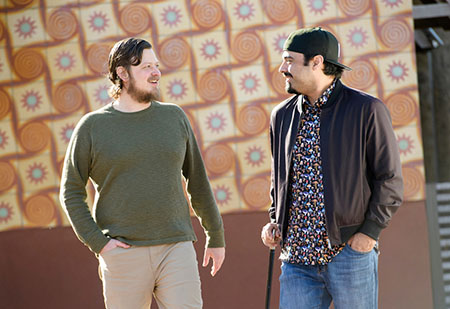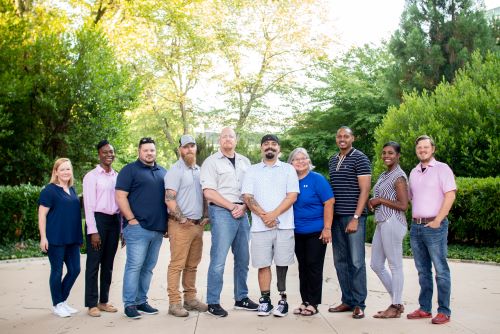From Marine to Musician: Finding Harmony with the Past

Music has always been a part of Sal Gonzalez’s life. His father gave him his first guitar for his 12th birthday. He loved plucking the strings and writing melodies. Despite describing himself as someone with low self-esteem, Sal loved putting on shows for his family.
“There is nothing like making people forget their trouble for a little while and just be happy,” he said.
As the child of immigrants, Sal said he developed a deep patriotism for the country that served as a haven for his family. “After 9/11, I felt called to serve and joined the Marines as soon as I was out of high school,” said Sal, who joined the 2nd Battalion 5th Marines unit as an infantry machine gunner and deployed to Iraq.
He’d only deployed for two months when, on Oct. 31, 2004, his unit encountered several improvised explosive devices (IEDs). Sal doesn’t remember much other than waking up a week later at Walter Reed Army Hospital in Bethesda, Maryland, being greeted by a man in a Wounded Warrior Project® (WWP) polo shirt.
“He said that on behalf of a grateful nation, he wanted me to have this – and it was a backpack full of what other people might think was trivial stuff, but it was mine,” Sal recalled.
The IED damaged Sal’s left leg. After enduring almost 30 surgeries over three months, Sal decided he was tired of the hospital.
“I made a decision. I told the doctors, ‘Cut it off.’ Let me walk again.”
Doctors amputated his leg below the knee and then sent Sal to a health care facility in San Antonio that specialized in prosthetics. Soon, he was on the move.
Climbing Up, Falling Down
During his time in Texas, Sal learned to walk again. He also reconnected with WWP™, thanks to another warrior’s invitation to go rock climbing. “I was like, ‘Bro, you’re missing an arm, and I’m missing a leg!’ But he was assured it would all work out. So, I went and learned to rock climb for the first time. It was really cool.”

Sal enjoys connecting with other warriors and uses their stories as inspiration for his music.
With his guitar by his side, Sal focused on his physical and mental health recovery, regaining mobility, and finding connections with others. Over time, he participated in other WWP activities, from simple dinners to go-cart racing, finding camaraderie along the way. But after he moved to Nashville, Tennessee, in 2005, the myriad of emotions surrounding his injuries and the abrupt end to his service took center stage.
“I’ve only been inherently talented at two things: the mechanical workings of a 50-caliber machine gun and music. There were only two paths in my life, and one was closed, so I ran from it and hid it,” said Sal, who began to disassociate from anything military-related.
Looking back, Sal admits that he was struggling with depression and post-traumatic stress disorder (PTSD) and coped with alcohol.
“I should have been pursuing a music career and dream of being a songwriter, but instead, I was self-medicating with alcohol just to be able to go out at night to play guitar and hang with friends. Then I’d drink myself to oblivion to go to sleep.”
The National Institute on Alcohol Abuse and Alcoholism (NIAAA) reports that more than 50% of individuals with alcohol use disorder and co-occurring PTSD are military personnel and veterans. People with PTSD commonly use alcohol as they try to cope with symptoms or numb memories from a traumatic event.
Data from Wounded Warrior Project’s Warrior Survey* found similar data, with over 43% of warriors who self-reported PTSD screening positive for potential hazardous drinking or active alcohol use disorders.
The Call of a Blue Bird
Recognizing Sal’s desire to pursue a music career, an acquaintance suggested he visit the Blue Bird Café, a Nashville mecca for many well-known country music writers; it’s where Garth Brooks and Taylor Swift were offered their record deals.
Sal picked a random night and joked that after witnessing the talent, he almost left town. His passion for music, though, made him stay.
“I may not have a lot of self-esteem, but I’m stubborn,” said Sal, who began writing guitar melodies as a teen before moving into lyrics. “I knew I had talent, but I also knew my songwriting wasn’t there yet. I needed to hear the best music as often as I could so that I could get better.”
Sal began working the door at the Blue Bird, which allowed him to hear – and meet – many renowned writers, producers, and singers. Though he kept writing, he wasn’t sure exactly what the future would hold.
A 180-Degree Ride

Sal plays his guitar whenever he can, but he also enjoys songwriting and finding opportunities to learn from other musicians.
In early 2009, Sal was invited to join a WWP Soldier Ride®. He tried to beg off, joking, “I’m not a soldier, but they said Marines can join, too.”
Sal agreed to join the multi-day event because of all the goodwill WWP had built up with him over the years and the camaraderie he found on previous outings. But Soldier Ride brought more than just a workout. Along the miles, Sal found some clarity and new friends. “I realized that all these guys and girls were going through the same stuff I was,” he said.
As Sal’s peer network grew, so did his mental health. “We started calling on each other, loving each other, wishing each other well. We all started doing better in our lives and becoming the people we wanted to become.”
Sal realized he wanted to do more.
“I did a total 180 from the way I had been living. It led me to start playing [music] for any veteran charity. Anything that would help vets, I would do,” he shared.
Sal eventually found work with a nonprofit in Nashville doing benefit concerts, but after a two-week USO tour, budget cuts eliminated his role.
“I knew I could make ends meet at the bar, but I didn’t want to take a step backward,” he said.
Then he remembered WWP.
“I had become friends with someone who worked with Wounded Warrior Project, so I called and got connected with Warriors to Work.”
Looking for a job is difficult enough for anyone, but it can be overwhelming for veterans, who often struggle to translate their military skills to a civilian career. WWP’s Warriors to Work® program helps veterans navigate the job search process and assists them in finding opportunities.

Sal, with other veterans and caregivers who are members of the Warriors Speak team, travel the country educating others about veteran-related issues, including their journeys with mental health, transitioning to civilian life, and other topics.
“I felt so helpless and lost when I first walked in, but it was wonderful to find out there was a team of people available to guide me, who were looking out for me and cared about me,” Sal said.
When reviewing potential opportunities, Sal learned that WWP was looking to expand its Warriors Speak team—a group of people who share their stories to raise awareness of the needs of post-9/11 veterans and caregivers. This was a perfect fit for Sal, who is a showman at heart.
The Emotional Draw of Music
Songwriting is personal for Sal. It’s a way to share stories that reflect on his military journey and those of other veterans who struggle with coming home from war and coping with loss and pain.
“My music is a way for the part of me that doesn't get expressed to get expressed,” he explained.
Some songs, though, are just for Sal. “Sometimes, I just need to get the emotion out. I put it down and put it away,” he said.
He loves to perform his songs in front of military audiences and then uses the feedback to motivate his next composition. “I like playing music in front of people, but playing in front of my people is a different kind of feeling,” he said, adding that he gets great satisfaction from knowing his music has helped other warriors on their mental health journeys.
“The best part of my job is hearing how they feel about my music, that it’s often the same way I feel. Hearing someone say that I captured feelings they could never articulate on paper and cut it perfectly is the best thing.”
Watch: Marine veteran Sal Gonzalez performing his original song Heroes
The Next Curtain Call
As a member of WWP's Warriors Speak team, Sal travels around the country, sharing motivational stories about sacrifice and service. He also talks about his mental health journey, the impact of WWP, and the opportunities available for other veterans.
During his presentations, Sal usually shares a song or two and encourages others to embrace creativity on their path to healing.

Sal enjoys opportunities to share his music with new audiences and is excited to be recording an album.
“Speaking has been incredibly beneficial for my mental health, just as much as my music,” said Sal. “If you're human and you're struggling, creative outlets can help you. It could be playing music, writing songs or stories, doing art, dance, martial arts …”
Sal and his music have gained great visibility over the years. He appeared on NBC’s America’s Got Talent and the television show Nashville and performed with country music star Keith Urban. He is working on an album with a Grammy Award-winning producer and juggling invitations to perform for audiences he never thought possible.
In May 2024, Sal debuted on the same stage that helped launch many country music careers, delivering an emotional performance that honored military heroes at the Grand Ole Opry.
Reflecting on the experience as the curtain went down: “It’s pretty significant. A Mexican kid from east LA playing at the church of country music. Who’d of thought?” exclaimed Sal. "Ultimately, it’s a stepping stone on this wild ride I’m on. Who knows where I’ll go or where I’ll end up? All I know is that I’m going to have fun getting there.”
Learn more about WWP-organized events, including creative workshops, and discover mental health resources for warriors and their loved ones.
Contact: Cynthia Weiss – Public Relations, cweiss@woundedwarriorproject.org, 904.738.2589
About Wounded Warrior Project
Since 2003, Wounded Warrior Project® (WWP) has been meeting the growing needs of warriors, their families, and caregivers — helping them achieve their highest ambition. Learn more.
*Warrior Survey, Wave 2 (conducted June 15-Aug. 24, 2022)